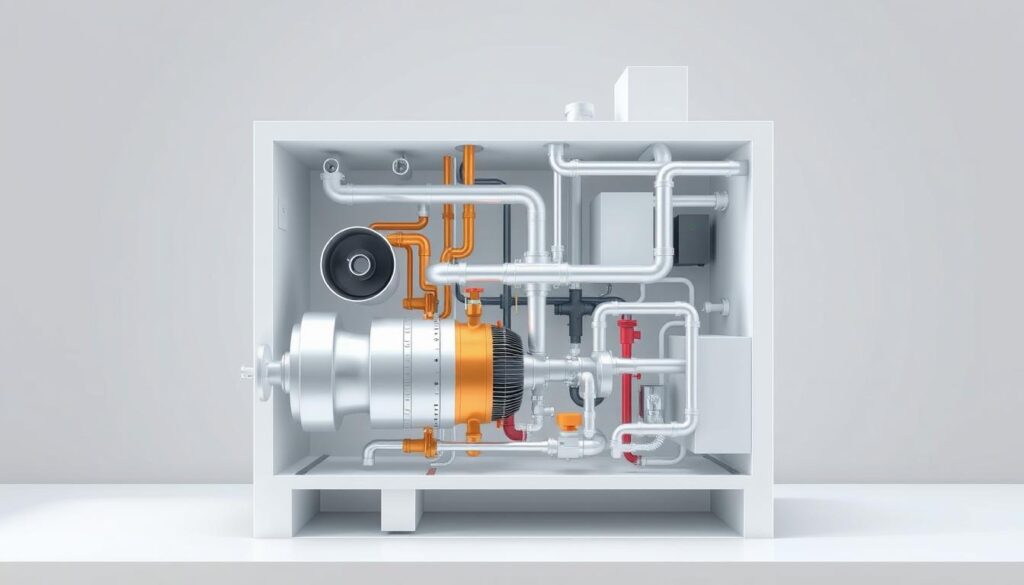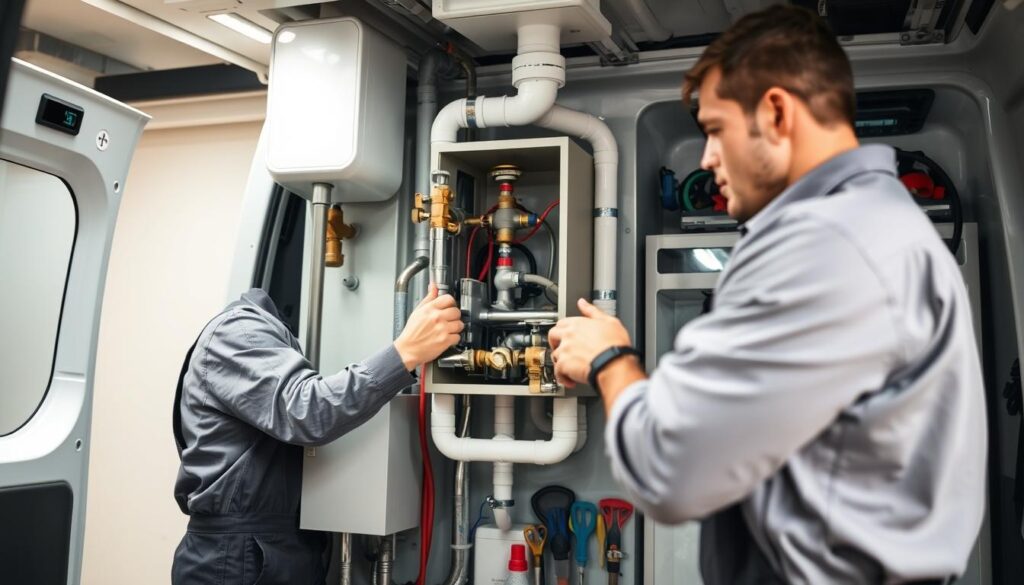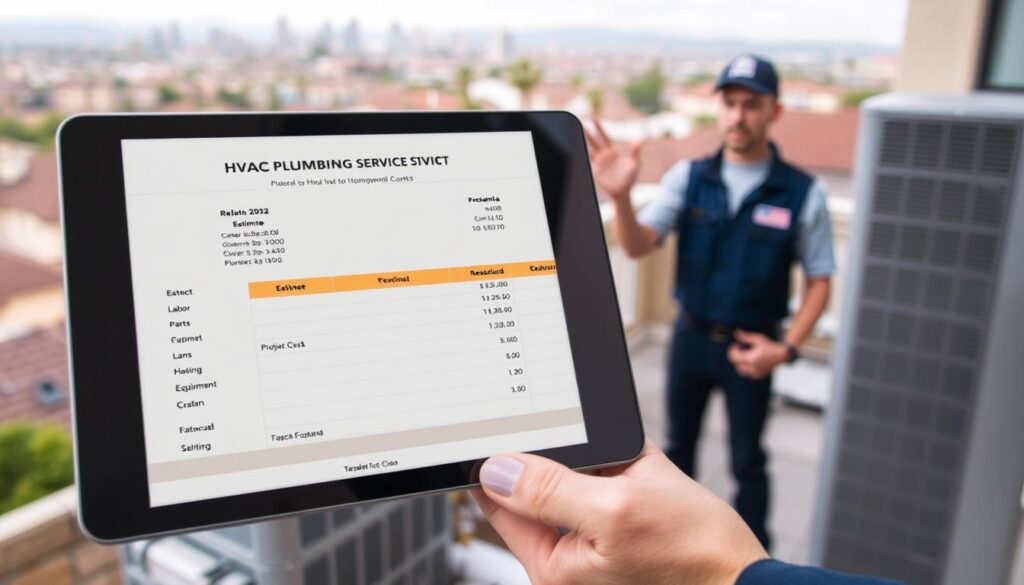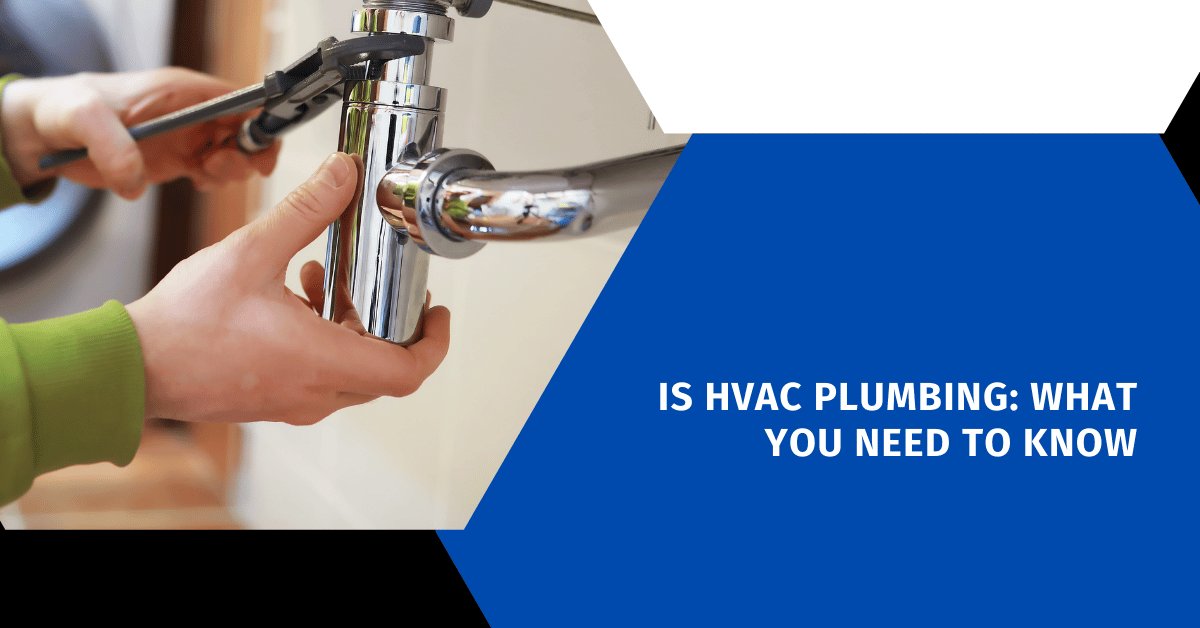Affiliate Disclosure
HVAC Guide Guys is a participant in the Amazon Services LLC Associates Program, an affiliate advertising program designed to provide a means for sites to earn advertising fees by advertising and linking to Amazon.
Is HVAC Plumbing? Ever thought about how your home’s pipes and systems work together? The world of HVAC plumbing is a blend of technologies that most people don’t think about.

The relationship between HVAC and plumbing is more than just water and air. Modern homes use complex systems for comfort, efficiency, and function. Knowing how these systems work can help you make smart choices about maintenance and installation.
Your home’s comfort relies on the teamwork of heating, cooling, and water systems. From radiant floor heating to handling condensate, HVAC plumbing is key to a comfortable home.
Key Takeaways
- HVAC plumbing involves complex interconnected systems
- Professional technicians often specialize in both HVAC and plumbing services
- Understanding system relationships improves home efficiency
- Modern homes require integrated technological approaches
- Regular maintenance prevents system failures
Table of Contents
Understanding the Relationship Between HVAC and Plumbing Systems
Exploring home infrastructure reveals a close bond between plumbing and HVAC systems. These systems work together to keep your home comfortable, efficient, and functional.
Modern HVAC systems with plumbing parts form a complex network. Knowing how these systems interact can help you maintain your home better. It might also save you money on energy costs.
Common System Intersections
Plumbing and HVAC systems overlap in several important areas:
- Water heaters that serve both heating and domestic water needs
- Radiant floor heating systems
- Condensate drainage lines in air conditioning units
- Hydronic heating systems
Integrated Components in Modern Homes
Today’s homes have advanced systems where plumbing and HVAC blend. Smart technology makes these systems work together smoothly. This leads to better energy management.
Impact on Home Efficiency
Working well together, plumbing and HVAC systems boost your home’s energy efficiency. Skilled technicians who know both areas can make your home more efficient. They help reduce waste and improve comfort.
Professional expertise is key in managing these connected systems well.
When thinking about home maintenance or upgrades, remember. Plumbing and HVAC are not separate systems. They are part of a bigger plan for home comfort.
Explore Our HVAC Shop
Looking for top-rated HVAC tools, parts, and accessories? Visit our shop and find the perfect solution for your needs.
Visit the ShopIs HVAC Plumbing Different From Traditional Plumbing?
Understanding the difference between HVAC and plumbing systems is key to managing your home. Both are vital, but they serve different purposes and require unique skills.
Traditional plumbing deals with water supply and drainage. Plumbers work on pipes, fixtures, and water installations. They are experts in:
- Repairing water lines
- Installing sinks and toilets
- Unclogging drains
- Managing water pressure
HVAC plumbing, on the other hand, combines plumbing with climate control. HVAC pros work with heating, cooling, and air systems.
| Plumbing Focus | HVAC Plumbing Focus |
|---|---|
| Water supply systems | Refrigeration cycles |
| Drain maintenance | Air quality management |
| Fixture installation | Climate control systems |
HVAC technicians need extra training in refrigeration and thermodynamics. They know how water affects heating and cooling systems. Their skills are more complex.
Knowing the difference helps homeowners call the right expert for their needs.
Key Components of HVAC Plumbing Systems
It’s important to understand how HVAC and plumbing work together. They form a complex system that controls temperature and water flow in your home.
Plumbing and HVAC systems are connected in a detailed network. They need special knowledge and careful engineering to work well.
Water-Based Heating Systems
Water-based heating systems are key in HVAC plumbing. They include:
- Boilers with advanced water circulation mechanisms
- Radiant floor heating networks
- Hydronic heating pipes
- Thermal expansion tanks
Cooling System Components
Cooling systems use complex plumbing parts to control temperature and humidity. Important parts are:
- Evaporator coils with precise water drainage
- Condensers that manage liquid transfer
- Refrigerant lines interconnected with plumbing networks
- Water-cooled condensing units
Drainage and Condensate Lines
Drainage systems are essential for HVAC efficiency. They prevent water damage and keep systems running smoothly by:
- Strategic moisture removal
- Preventing water buildup
- Keeping electrical parts dry
- Ensuring system performance
Keeping these systems in good shape needs professional help and regular checks. This ensures they work well for a long time.
Professional Requirements for HVAC and Plumbing Work
Understanding the career requirements for professional hvac plumbing services is key. Plumbers and HVAC technicians are not the same, but both need strong qualifications and training.
Getting certified in HVAC and plumbing involves a lot of education. These jobs require a deep commitment to learning complex technical skills.
- Complete state-approved apprenticeship programs
- Obtain mandatory licensing credentials
- Pass technical and practical examinations
- Maintain ongoing professional education
The apprenticeship lasts 4-5 years. It mixes hands-on training with classroom learning. Trainees must gain thousands of hours of work experience and finish technical courses.
“Success in HVAC and plumbing careers requires continuous learning and adaptability in a rapidly changing technological landscape.”
Licensing rules differ by state. But, most states require certain education, work experience, and passing certification tests. HVAC and plumbing services need a lot of technical skill and a focus on safety.
It’s also important to keep learning. New technologies and rules come up all the time. Professionals must keep up with the latest in energy-saving systems and building codes.
Explore Our HVAC Shop
Looking for top-rated HVAC tools, parts, and accessories? Visit our shop and find the perfect solution for your needs.
Visit the ShopEssential Skills and Certifications for HVAC-Plumbing Technicians
Professional HVAC plumbing services need a mix of technical skills and training. Technicians must know how to work with both HVAC and plumbing systems. This ensures they can handle complex home systems well.
Professionals in this field need strong technical skills and certifications. They must keep learning and growing in their careers.
Required Technical Knowledge
Technicians need to know a lot about several areas:
- Thermodynamics principles
- Fluid dynamics understanding
- Electrical system comprehension
- Advanced diagnostic techniques
- Equipment installation and maintenance
Licensing and Certification Requirements
Each area has its own certification rules for HVAC plumbing services. For example, those working with refrigerants might need an Ozone Depletion Prevention (ODP) card.
- State-specific licensing exams
- EPA refrigerant handling certification
- Gas technician credentials
- Specialized trade certifications
Ongoing Education and Training
The field of HVAC and plumbing keeps changing with new tech. Professionals should:
- Take annual training workshops
- Update their technical skills
- Learn about new technologies
- Go to industry conferences
Keeping up with new tech ensures high-quality service and keeps professionals competitive.
Common HVAC Plumbing Services and Maintenance
Professional HVAC plumbing services are key to keeping your home comfortable and efficient. Knowing what maintenance tasks are important helps keep your systems working well.

HVAC plumbing needs special skills to handle different tasks. Technicians do several important maintenance jobs:
- Inspecting and cleaning condensate lines
- Checking water-based heating system components
- Verifying refrigerant levels
- Examining radiant floor heating connections
Keeping your home comfortable is all about regular maintenance. It stops expensive repairs and keeps your HVAC and plumbing systems running great.
| Service Type | Frequency | Key Benefits |
|---|---|---|
| Condensate Line Cleaning | Bi-Annual | Prevents water damage and system blockages |
| Water Heater Inspection | Annual | Ensures efficient heating and extends system life |
| Refrigerant Level Check | Seasonal | Maintains cooling system efficiency |
Professional HVAC plumbing services handle many important maintenance tasks. Experts say you should get your systems checked at least twice a year. This catches problems early and keeps your home’s systems running smoothly.
Proactive maintenance is always more cost-effective than emergency repairs.
When to Call an HVAC Technician vs. a Plumber
Knowing the difference between HVAC and plumbing services can save you time and money. It also helps prevent damage to your home. Both professionals are important for home maintenance, but they focus on different areas.
Figuring out when to call for HVAC or plumbing help is key. You need to know the signs that show which service you need.
Emergency Situations
Some emergencies need quick help from professionals. Here are a few examples:
- Burst water pipes need fast plumbing action
- Complete HVAC system failure in extreme weather
- Water heater problems
- Severe drainage blockages
Routine Maintenance Needs
| Plumbing Service Needs | HVAC Service Needs |
|---|---|
| Annual pipe inspections | Seasonal system tune-ups |
| Water pressure checks | Air filter replacements |
| Drain cleaning | Ductwork evaluation |
Installation Requirements
Some projects need both HVAC and plumbing experts. Radiant floor heating and water heater installations are examples.
Understanding these differences helps you handle home system maintenance and repairs well. This keeps your home comfortable and working right.
Explore Our HVAC Shop
Looking for top-rated HVAC tools, parts, and accessories? Visit our shop and find the perfect solution for your needs.
Visit the ShopCost Considerations for HVAC Plumbing Services

Understanding the cost of professional hvac plumbing services is key for homeowners. The price can change a lot based on several important factors.
When planning your budget for HVAC plumbing services, consider these cost factors:
- System complexity
- Age of existing equipment
- Type of service required
- Regional labor rates
Prices for professional services can vary a lot. Here’s a look at what you might pay:
| Service Type | Average Cost Range |
|---|---|
| Routine Maintenance | $150 – $300 |
| Minor Repairs | $250 – $600 |
| Major System Overhaul | $1,500 – $5,000 |
Regular maintenance can prevent expensive repairs and make your systems last longer. Experts suggest yearly checks to find problems early and keep systems running well.
Energy-saving upgrades might cost more upfront but save money in the long run. Talking to a professional HVAC service can guide you in choosing the best for your home’s comfort and efficiency.
Conclusion
HVAC plumbing is key to your home’s comfort and technical know-how. Knowing about this field helps you make smart choices for your home. It’s about understanding how heating, cooling, and plumbing work together.
Experts in HVAC and plumbing are essential for your home’s systems to work right. They have the skills and knowledge to fix complex problems. Regular maintenance and working with pros can save you money and keep your systems running longer.
Knowing about HVAC and plumbing gives you power over your home’s systems. It lets you make informed decisions about care and upgrades. Being proactive and informed helps you create a more comfortable and efficient home.
Your home’s comfort and function rely on knowing about these systems. Whether you own a home or want to work in HVAC plumbing, learning and expertise are vital. They help you navigate this important field.

